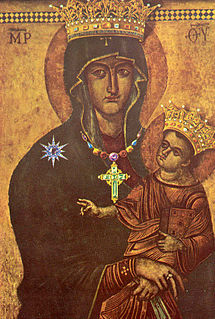Veritatem Facientes (March 27, 1952) is an apostolic letter of Pope Pius XII to the Catholic faithful of Romania, [1] protesting against their persecution and the virtual eradication of the Catholic Church in their country. The letter asks for courage and prayers.

Pope Pius XII, born Eugenio Maria Giuseppe Giovanni Pacelli, was head of the Roman Catholic Church from 2 March 1939 to his death. Before his election to the papacy, he served as secretary of the Department of Extraordinary Ecclesiastical Affairs, papal nuncio to Germany, and Cardinal Secretary of State, in which capacity he worked to conclude treaties with European and Latin American nations, most notably the Reichskonkordat with Nazi Germany.

Romania is a country located at the crossroads of Central, Eastern, and Southeastern Europe. It borders the Black Sea to the southeast, Bulgaria to the south, Ukraine to the north, Hungary to the west, Serbia to the southwest, and Moldova to the east. It has a predominantly temperate-continental climate. With a total area of 238,397 square kilometres (92,046 sq mi), Romania is the 12th largest country and also the 7th most populous member state of the European Union, having almost 20 million inhabitants. Its capital and largest city is Bucharest, and other major urban areas include Cluj-Napoca, Timișoara, Iași, Constanța, Craiova, and Brașov.
Persecution is the systematic mistreatment of an individual or group by another individual or group. The most common forms are religious persecution, racism and political persecution, though there is naturally some overlap between these terms. The inflicting of suffering, harassment, imprisonment, internment, fear, or pain are all factors that may establish persecution, but not all suffering will necessarily establish persecution. The suffering experienced by the victim must be sufficiently severe. The threshold level of severity has been a source of much debate.
Seven years after World War II, when Pope Pius XII wrote to the Catholics in Romania, the situation of the Church had changed drastically. The Romanian Greek-Catholic Church was outlawed by government decree on December 1, 1948 and ceased to exist officially. All bishops were incarcerated at the time of the decree; foreign priests were expelled, domestic priests were imprisoned as well. [2] Two of five Roman Catholic dioceses were officially recognized; their bishops were jailed as well. Three dioceses were closed. All Church schools and institutes were closed. As in other countries, the regime in Romania attempted to create a schismatic Catholic Church. The Catholic media were outlawed and closed and all religious houses confiscated and closed as well. [3]

World War II, also known as the Second World War, was a global war that lasted from 1939 to 1945. The vast majority of the world's countries—including all the great powers—eventually formed two opposing military alliances: the Allies and the Axis. A state of total war emerged, directly involving more than 100 million people from over 30 countries. The major participants threw their entire economic, industrial, and scientific capabilities behind the war effort, blurring the distinction between civilian and military resources. World War II was the deadliest conflict in human history, marked by 70 to 85 million fatalities, most of whom were civilians in the Soviet Union and China. It included massacres, the genocide of the Holocaust, strategic bombing, premeditated death from starvation and disease, and the only use of nuclear weapons in war.
Veritatem Facientes gives an overview of the sufferings and persecutions of the Church in Romania. The Pontiff states that this writing is the only way to reach the faithful of Romania, who had suffered so much in the past few years. It is therefore his obligation to protest and defend the freedom and interests of the Church and its faithful. All bishops are incarcerated or sent away (to Siberia). The Greek-Catholic Church has been declared illegal. Because the Catholic press has been confiscated and outlawed, there is no way to reach the faithful by that way either. With all the Catholic voices silenced, it is rather easy, to rail against the Church as an enemy of the State. Therefore, if the faithful are attacked or persecuted because of their faith, they should view this as an honour, not anything to be ashamed of. [4]

Siberia is an extensive geographical region spanning much of Eurasia and North Asia. Siberia has historically been a part of modern Russia since the 17th century.

The news media or news industry are forms of mass media that focus on delivering news to the general public or a target public. These include print media, broadcast news, and more recently the Internet.

Christian Church is an ecclesiological term generally used by Protestants to refer to the church invisible, and/or whole group of people belonging to Christianity throughout the history of Christianity. In this understanding, "Christian Church" does not refer to a particular Christian denomination but to the "body" of all "believers", both defined in various ways. Other Christian traditions, however, believe that the term "Christian Church" or "Church" applies only to a specific concrete historic Christian institution, e.g. the Catholic Church, the Eastern Orthodox Church, the Oriental Orthodox Churches, or the Assyrian Church of the East.
The Pope "would like to kiss the chains of all those who are incarcerated for their faith", [4] knowing that they are more worried about the future of the country and souls, than their own fate and loss of freedom. The Pontiff asks the faithful to gaze to heaven and be aware, that the everlasting light of eternal happiness expects those who are persecuted. He also asks for prayers, so God may grant peace now to the people and nations, that peace which secures freedom, and the freedom of worship and the dignity of every person.
He reminds his Romanian readers that the Church in their country has great saints who went through very difficult trials in their time. The Romanian faithful of today are the direct offspring of these great saints and should follow their great examples. Several times in Romanian history, contacts with the Holy Apostolic See were interrupted, as they are now. But, after some time, relations began to flourish again [5] There will be no shortage of difficulties, jail, loss of property, tortures and more. But it is preferable not to negate one's faith in God. The Pope expresses his hope that many may be able to read his letter and find some comfort in it. May they continue on the path of faith, and receive divine strength in their difficulties. Because God is the centre of the issue, no one should take this easily, or lose courage. The saints, who make up the glory of Romania, will assist together with the blessed Virgin Mary. She will obtain from her son the graces which her children truly need. The Pope and the whole Catholic world will pray with the Romanian Catholics, so Romanians may live in full freedom, publicly and privately confessing their faith. Pope Pius XII concludes his letter with his Apostolic Blessing. [6]


